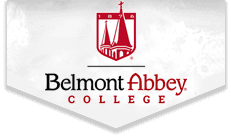- emphasizing behavior, mental processes, and emotion using scientific methods and applying such study for the promotion of human welfare
- comprehension and evaluation of psychological research presented in the popular press
- understanding the role of theory in psychology
- developing research skills and examining the role of evidence in psychology
- analyzing the dynamics of the human person as an individual, a member of a family, of a group, and of a community
You’ll enjoy the Abbey’s psychology major if you:
- are fascinated by the human person as well as group, family, and marriage dynamics
- are a good listener
- are comfortable with empirical data
- recognize the inherent self-worth of the human person as created by God
- want to help others with their problems
- enjoy thinking logically and scientifically
Majors in the department will:
- be familiarized with APA style, research techniques and how to conduct a credible psychological study
- develop knowledge, skills, and values consistent with the science and application of psychology
- critically evaluate the production, interpretation, and application of psychological research to understand the human person and promote human welfare
- understand the philosophical and historical background of psychology
- embrace opportunities for practical professional experiences and career exploration
With a Psychology bachelor’s degree from Belmont Abbey College, you will be able to pursue a variety of career opportunities, including:
-
Counseling
-
Psychiatrist
-
Social work
-
Clinical, forensic, or engineering psychologist
-
School or sports psychologist
-
Teaching
-
Behavior Tech
-
Law Enforcement
-
Sales
-
Human Resources
Psychologists are ubiquitous in a vast number of career fields, from counseling to clinical psychology to social work. Pursuing a bachelor’s degree in psychology is widely practical because knowledge of the way humans think is useful in any line of work. Some of these careers do require a graduate degree and professional license.
The Abbey Difference:
In accordance with the Catholic, Benedictine, and liberal arts traditions, the Psychology Department supports students’ learning of the cumulative knowledge base and methods central to psychology within a framework of ethical principles and integration of knowledge. Our commitment is to educate the whole student effectively, integrating the intellectual, behavioral, spiritual, and emotional aspects inherent in the scientific study of behavior, mental processes, and emotion, and the application of psychological science to the promotion of human welfare. Regardless of the career path taken by our students after graduation, our goal is to enable them to think clearly and act with integrity in their professional, public, and personal lives.
Highlights of your experience:
In addition to learning fundamental physiological principles that underlie normal and disordered behavior, mental processes and emotion, students engage in well-informed critical and civil discussion of how bio-psychological knowledge and principles can be used ethically to understand and influence a wide range of problems. In addition to two exams, students do an assignment on differences in sex development such as Turner Syndrome and Complete Androgen Insensitivity Syndrome (AIS) and short multimedia presentations on cutting edge topics such as sensory substitution devices or deep brain stimulation.
We regularly offer Special Topics courses. Recent offerings have included Cultural Psychology, Research on Financial Literacy, and Psychology and Film.
This is a very popular course for psychology majors and minors and students from other majors. Students examine psychological theories and research that shed light on group behavior and the effects of social environments on individual behavior. Specific topics include cognitive attribution, conformity, gender roles, interpersonal relationships, and prejudice. Assignments may include not only exams and papers and class participation but also an analysis of a popular film.
Psychology Resources:
The Psychology Club occasionally co-sponsors educational programs such as Eating Disorder Awareness or national depression screening events. Educational/social events are sponsored as well, like movie nights where a film is followed by a discussion led by a psychology professor. Members of the Psychology Club also raise funds to co-sponsor the annual Central Carolinas Conference in Psychology, a local undergraduate conference put on by a partnership of BAC, UNCC, Queens, and Johnson C. Smith University. The Psychology Club helps to organize student travel to professional conferences, such as the Southeastern Psychological Association meetings in Orlando, Atlanta, Charleston, and other cities in the southeast.
Program Requirements:
(This option requires day courses.)
In addition to the other Core Curriculum requirements, the following are specific core requirements:
- PC 201 Introduction to Psychology
- MA 135 or higher (prerequisite for PC 300)
Major requirements:
- PC 215W Science and Practice of Psychology
- PC 225 Integration of Psychology
- PC 300 Statistics for Psychology (Fall)
- PC 301 Developmental Psychology
- PC 307W Research Methods for Psychology (Spring)
- PC 308 Theories of Personality
- PC 360 Social Psychology
- PC 407 Testing and Assessment (Spring)
- PC 410W/411W/412W Senior Capstone (Fall of senior year)
- PC upper-level electives (18 hours)
Other Courses :
- Internship is encouraged (1-6 hours)
- General elective hours (13-18 hours)
(Taking a Minor is encouraged)
It is the student’s responsibility to see that all degree requirements for graduation are fulfilled.
Notes
1. Several courses have prerequisites; please see course descriptions for other details.
2. PC 215W and PC 300 (Fall course) are prerequisite for PC 307W (Spring course) and for PC 407. PC 307W is a prerequisite for PC 410W, PC411W, and PC412W (senior year). PC 407 is a pre-requisite for PC 411W (senior year).
3. Although an internship is not required, it is strongly recommended for (and counts as) a PC upper-level elective for the B.A. in Psychology, B.S. in Psychology and the minor in Psychology.
4. Any course numbered above PC 201 is considered an upper-level PC course.
(This option requires day courses.)
In addition to the other Core Curriculum requirements, the following are specific core requirements:
- PC 201 Introduction to Psychology
- MA 135 or higher (prerequisite for PC 300) (N.B.: MA 151 is often a prerequisite for students taking CH, PY, MA courses)
Major requirements:
-
- PC 215W Science and Practice of Psychology
- PC 225 Integration of Psychology
- PC 300 Statistics for Psychology (Fall)
- PC 301 Developmental Psychology
- PC 305 Biological Psychology
- PC 306 Cognitive Psychology
- PC 360 Social OR
PC 308 Theories of Personality - PC 313 Abnormal Psychology
- PC 307W Research Methods for Psychology (Spring)
- PC 407 Testing and Assessment (Spring)
- PC 410W/411W/412W – Senior capstone (Fall of senior year)
- Two PC upper-level electives
Other Courses :
-
-
- BI, EV, CH, PY, SC300, or MA courses beyond core requirements (8 hours)
- Internship is encouraged (1-6 hours)
- General elective hours (14-19 hours)
(Taking a Minor is encouraged)
-
It is the student’s responsibility to see that all degree requirements for graduation are fulfilled.
Notes
1. Several courses have prerequisites; please see course descriptions for other details.
2. PC 215W and PC 300 (Fall course) are prerequisite for PC 307W (Spring course) and for PC 407. PC 307W is a prerequisite for PC 410W, PC411W, and PC412W (senior year). PC 407 is a pre-requisite for PC 411W (senior year).
3. Although an internship is not required, it is strongly recommended for (and counts as) a PC upper-level elective for the B.A. in Psychology, B.S. in Psychology and the minor in Psychology.
4. Any course numbered above PC 201 is considered an upper-level PC course.
The concentration in Applied Psychology is an option for students pursuing the B.A. in Psychology or the B.S. in Psychology. With careful planning, it is possible for B.A. in Psychology majors to fit the concentration into the major without additional course requirements. For B.S. majors, at least one additional course is required beyond the major requirements.
Three of the following:
-
-
- PC 303 Special Topics in Applied Psychology
- PC 330 Industrial/Organizational Psychology
- PC 340 Sport Psychology
- PC 350 Psychology of Addiction
- PC 404 Seminar in Counseling
- Other applied psychology course approved by department chair
-
One of the following:
-
-
- PC 411W Senior Practicum Seminar (Fall of senior year)
- PC 453 Internship
-
It is the student’s responsibility to see that all degree requirements for graduation are fulfilled.
Notes
1. Several courses have prerequisites; Please see course descriptions for other details.
2. PC 215W and PC 300 (Fall course) are prerequisite for PC 307W (Spring course) and for PC 407. PC 307W is a prerequisite for PC 410W, PC411W, and PC412W (senior year). PC 407 is a pre-requisite for PC 411W (senior year).
3. Although an internship is not required, it is strongly recommended for (and counts as) a PC upper-level elective for the B.A. in Psychology, B.S. in Psychology and the minor in Psychology.
4. Any course numbered above PC 201 is considered an upper-level PC course.
Fifteen (15) credit hours of Psychology beyond the core curriculum as approved by the department chair.
Students who take PC 201 to satisfy the Social Science core curriculum requirement must take an additional 15 credit hours of upper level PC courses to earn the minor. Students who take a course other than PC 201 to satisfy the Social Science core curriculum requirement may take PC 201 and an additional 12 credit hours of upper level PC courses to earn the minor.
The preponderance of the courses for the minor must be taken at Belmont Abbey College.
It is the student’s responsibility to see that all degree requirements for graduation are fulfilled.
Faculty:
Dr. Shane Gomes
Chair of Psychology
B.S., University of California, 1992
M.A., California School of Professional Psychology, 1994
Ph.D., California School of Professional Psychology, 2000
Dr. Nathalie Coté
Professor of Psychology
B.A., Furman University
M.S., Vanderbilt University
Ph.D., Vanderbilt University
Dr. Ann Calhoun-Sauls
Associate Professor of Psychology
B.A., University of North Carolina-Charlotte
M.A., University of North Carolina-Greensboro
Ph.D., University of North Carolina-Greensboro
Dr. Diana Elliott
Associate Professor of Psychology
B.S., University of New Hampshire
M.Ed., University of Houston
M.A., Biola University
Ph.D., Biola University



